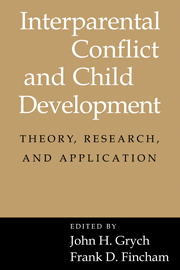Book contents
- Frontmatter
- Contents
- List of Contributors
- Preface
- Interparental Conflict and Child Adjustment: An Overview
- Part One Foundations
- Part Two Basic Processes
- Part Three Family and Peer Contexts
- Part Four Applications
- 15 Clinical Prevention and Remediation of Child Adjustment Problems
- 16 Interparental Conflict and Social Policy
- Part Five Future Directions
- Author Index
- Subject Index
16 - Interparental Conflict and Social Policy
Published online by Cambridge University Press: 01 May 2010
- Frontmatter
- Contents
- List of Contributors
- Preface
- Interparental Conflict and Child Adjustment: An Overview
- Part One Foundations
- Part Two Basic Processes
- Part Three Family and Peer Contexts
- Part Four Applications
- 15 Clinical Prevention and Remediation of Child Adjustment Problems
- 16 Interparental Conflict and Social Policy
- Part Five Future Directions
- Author Index
- Subject Index
Summary
What can social policy do to ease interparental conflict? The enormity of the task begins to come into focus when we consider the potential complexity of interparental conflict. Co-parents are not just parents, but they play multiple roles in their relationship with each other. In addition, there are many possible topics of conflict between parents including but not limited to various issues related to children and parenting. Further, disagreement or anger can be discussed or otherwise communicated in many different ways. Given the diversity of American families, moreover, the interparental relationship may be based on several different legal grounds other than marriage. Finally, the implementation of potential policies is complicated greatly by the historical respect for family privacy and family autonomy found in American family law.
The Multifaceted Co-Parenting Relationship
Consider these complications in a bit more detail. The co-parenting relationship is a multifaceted one. Co-parents are not just parents, but they may be each other's friend (or enemy), lover (or estranged mate), protector (or abuser), economic partner (or competitor), family member (or cast-off). These roles typically are interdependent, thus, for example, interparental conflict may be a result of, or an expression of, an ongoing dispute about altogether different aspects of the co-parents' relationship. It has been suggested, for example, that many child custody disputes may really be attempts to block divorce or to maintain contact with a former spouse rather than (or in addition to) being disagreements about contact and control of the children (Emery, 1994).
- Type
- Chapter
- Information
- Interparental Conflict and Child DevelopmentTheory, Research and Applications, pp. 416 - 439Publisher: Cambridge University PressPrint publication year: 2001
- 6
- Cited by



